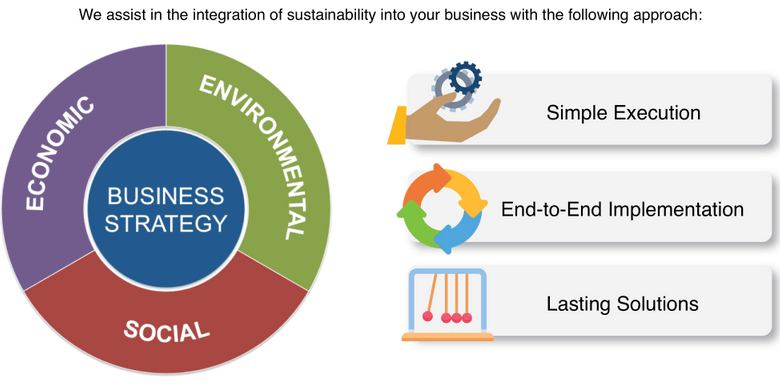How to Incorporate Sustainability in Your Business Strategy

The world is becoming increasingly unpredictable. Climate change, shrinking natural resources, and the growing strain on energy and food supplies are creating disruptions that many businesses are struggling to manage. These challenges are impacting everything from daily operations to long-term supply chains.
In response, businesses, whether private or public, must rethink their approach. The traditional way of doing things no longer suffices. To survive and grow, businesses need to embrace sustainability as a core element of their strategy. Building a resilient and agile business means adopting practices that meet today’s demands. They must also safeguard the planet for the future.
This article will explore how to effectively incorporate sustainability into your business strategy.
What is Sustainability in Business?
Sustainability in business means adopting strategies and actions that lessen negative impacts on the environment and society. This approach is often assessed through environmental, social, and governance (ESG) metrics.
As the planet faces permanent changes, the dangers of climate change have become too serious to overlook. The crossing of environmental boundaries is raising fears of widespread effects on natural systems and human societies. This situation is pushing businesses to set sustainability goals, which also opens up new opportunities.
Despite the challenges of the COVID-19 pandemic, many companies continued to pursue the Sustainable Development Goals (SDGs) set by the United Nations General Assembly. These goals, introduced in 2015 with a target for 2030, offer a clear path for businesses. They address key areas such as poverty, inequality, environmental damage, and climate change. The SDGs provide a roadmap for businesses aiming to integrate sustainability into their core operations.
Why is Sustainability in Business Important?
Sustainability in business is important for both ethical and financial reasons. Employees are increasingly drawn to companies with a clear mission and a commitment to the planet. About 71% of workers and job seekers find environmentally sustainable companies more appealing as employers.
Consumers are also showing strong support for responsible brands. Around 80% of them value sustainability and are willing to pay more for products from companies that prioritize environmental responsibility.
Governments, investors, employees, and customers are all pushing for greater corporate accountability. They expect businesses to take meaningful steps to address climate change.
Many leading economies are introducing or have already implemented requirements for companies to disclose their environmental impact. This encourages businesses to reduce their greenhouse gas emissions.
The growing focus on ESG (Environmental, Social, and Governance) criteria and sustainable investing is making sustainable businesses more attractive to investors. By 2025, investments in ESG assets could reach USD 53 trillion, accounting for over a third of global assets.
Benefits
Businesses that adopt sustainable practices are seeing several key benefits.
One of the main advantages is gaining a competitive edge. Many consumers, around 55%, view environmental responsibility as important when choosing which brands to support. Being recognized as a sustainable company can boost brand awareness. It attracts customers who prefer businesses committed to sustainability.
Sustainability also appeals to investors. In 2021, most personal investors, about four out of five, planned to consider sustainability and social responsibility in their investment choices. This trend makes sustainable businesses more attractive to potential investors.
Meeting regulatory standards is another important benefit. Governments are expanding regulations related to sustainability. So, implementing sustainable solutions early helps businesses stay ahead. Regularly measuring, benchmarking, and reporting on ESG performance ensures ongoing compliance with these evolving requirements.
Sustainability also enhances the value of transformational investments. The COVID-19 pandemic accelerated digital transformation in many companies. By ensuring these transformations are sustainable, businesses build resilience and prepare for future challenges and opportunities.
Attracting and retaining talent is another benefit. Many employees are looking for meaningful work and want to join companies that prioritize sustainability and social responsibility. A reputation for sustainability helps attract the right talent and keeps them engaged.
Lastly, sustainability can lead to revenue growth. By reducing resource use and improving operational efficiency, businesses can enhance their bottom line. While some sustainable efforts may require an initial investment, the long-term financial benefits make them worthwhile.
How to Create an Effective Sustainability Strategy
Jessica Shee of m3datarecovery.com said, to create an effective sustainability strategy, start by utilizing digital technologies like artificial intelligence (AI), Internet of Things (IoT) data, blockchain, and hybrid cloud. These tools can make sustainability efforts more efficient and reveal ways to motivate employees and satisfy customers. A successful strategy balances environmental goals with market demands and unique business strengths.
Begin by making sure all stakeholders share a clear vision for the company’s future. Bringing in external help can align everyone. Apply a structured, time-bound approach to spread the sustainability vision across the entire organization. Develop an environmental management system that defines roles, responsibilities, and accountability.
Start with concrete projects that show clear, measurable results. These initial successes will highlight the value of sustainability, gain support, and help expand efforts effectively.
Four essential focus areas are crucial for planning a resilient and profitable future:
Climate Risk Management and ESG Reporting
In recent years, natural disasters have had a major impact. This highlights the need for businesses to consider climate change in their operations. Extreme weather and climate events are becoming more frequent and severe. Companies must integrate climate risk into their planning and operations to ensure resilience and continuity.
To manage climate risk, organizations need to use solutions that combine various data sources. This includes proprietary data, third-party sources, geospatial information, weather data, and IoT insights. Advanced analytics can help predict and prepare for critical weather events. They support sustainable development and maintain business continuity. Additionally, these solutions can simplify and reduce the cost of ESG compliance and reporting.
Understanding climate risk is essential. Businesses must model and anticipate the effects of climate change on their operations. This involves tracking the impact of extreme weather conditions like storms, wildfires, and floods. Accurate risk assessment helps businesses make informed decisions to protect their assets and operations.
Resilient Infrastructure and Intelligent Operations
Today’s global challenges include climate change, environmental damage, and resource management. To address these issues, businesses need resilient infrastructure and intelligent operations. Effective asset management is key to achieving this.
Managing assets smartly can extend their lifespan, cut maintenance costs, and reduce downtime. Predictive maintenance and monitoring are important for this. They help in maintaining assets efficiently, minimizing CO2 emissions, and cutting waste. Such practices align with ESG goals and boost profitability.
Sustainable operations begin with asset management. Buildings, energy grids, and industrial equipment contribute to sustainability challenges. Implementing good asset management practices can help address these challenges. For example, managing maintenance requests efficiently can reduce fuel consumption and increase operational efficiency. Mobile tools for maintenance teams can improve first-time fix rates and cut down on repeat visits.
Using AI and IoT can further enhance asset performance. Remote monitoring provides a clear view of asset performance across the organization. Predictive maintenance plans can improve asset availability and longevity while reducing CO2 emissions. AI-driven inspections can identify small defects before they turn into major problems, helping to cut waste.
Green buildings are another area of focus. Making buildings environmentally responsible involves considering every phase of their lifecycle. This includes design, construction, operation, and even deconstruction. By using advanced asset management technologies, it’s possible to reduce energy use and lower the carbon footprint of buildings. For instance, monitoring and managing HVAC systems and other building assets with AI can lead to more efficient operations.
Planning for weather impacts is also essential. Weather affects all aspects of business operations, from raw material acquisition to delivery. Accurate weather data helps in predicting energy demand, avoiding disruptions, and optimizing routes for efficiency. This reduces CO2 emissions from vehicles and enhances overall operational resilience.
Sustainability is becoming a key business focus. Consumers, employees, and shareholders are increasingly considering environmental responsibility. A strong sustainability strategy is now seen as crucial for staying competitive.
Building a More Sustainable Supply Chain
Elisa Bender of RevenueGeeks said, consumers are increasingly concerned about where their products come from, pushing companies to invest in circular economies that promote reuse. Blockchain technology can enhance supply chain transparency by offering real-time inventory data and performance insights. This builds trust and ensures product authenticity from start to finish while cutting down on waste and costs. Blockchain also helps address complex Scope 3 emissions by confirming product origins and optimizing delivery to reduce logistics-related emissions using advanced AI.
Turning sustainability goals into reality is difficult. Many companies struggle with gaps in their sustainability plans and a lack of integration of sustainability into their business processes. Since much of the supply chain is beyond direct control, making improvements can be challenging. Intelligent supply chain solutions offer better visibility, traceability, and control to tackle these challenges.
Sustainability in the supply chain is critical, as it impacts up to 90% of the emissions related to products and services. Many organizations are setting sustainability goals, with nearly half having established these targets. A growing focus on circular economies, which reduce waste through reuse and recycling, is evident. Meeting consumer, employee, investor, and regulatory expectations is vital for long-term success.
Electrification, Energy, and Emissions Reduction
Achieving large-scale clean electrification requires new collaborations and a fresh look at how electrical systems work. Leaders must rethink their approach to ensure a net-zero greenhouse gas emissions economy. The goal is to drive decarbonization by improving grid efficiency, safety, and reliability. Intelligent asset management is key to this transformation. Implementing smart metering can help track resource use, maintain critical assets, enhance efficiency, reduce costs, and improve services through automation.
Decarbonizing the global economy demands new partnerships and ecosystems. Utility companies must increase clean energy in the grid and manage its complexities effectively. Transitioning from fossil fuels to electricity generated from renewable sources like wind, solar, and hydro is essential. Utilities will play a central role in this transition by driving global decarbonization.
Around 70% of global greenhouse gas emissions can be addressed through clean electrification. Major industries are investing heavily in this process. For example, US automakers committed USD 250 billion to vehicle electrification by 2023. Despite the pandemic, 2020 saw a record year for green energy, with over 80% of new electricity capacity coming from renewable sources.
Scaling clean electrification requires a new approach to electrical systems. As more sectors depend on electricity, the complexity of electricity ecosystems will increase. The number of resources connected to the grid will grow, leading to more intricate information flows.
Digital transformation is also important for decarbonization and delivering clean energy safely and reliably. Digital tools using AI, IoT, and blockchain can create new energy marketplaces and improve infrastructure resilience. These tools also enhance utility operations and customer service.
Utility asset management solutions help keep assets running efficiently and provide a comprehensive view of their health. Advanced metering infrastructure (AMI) solutions enable utilities to adapt to changing demands, including distributed energy and electric vehicles. These technologies support real-time data processing and grid modernization. This creates new value for utility operations and transforms the customer experience.
Incorporating sustainability into a business strategy is important for long-term success. It helps businesses handle global challenges like climate change and resource shortages. By focusing on sustainable practices, companies can improve their operations, attract customers and investors, and meet regulatory requirements. A commitment to these practices ensures that businesses are well-prepared for the changes ahead and can contribute to a healthier planet.



